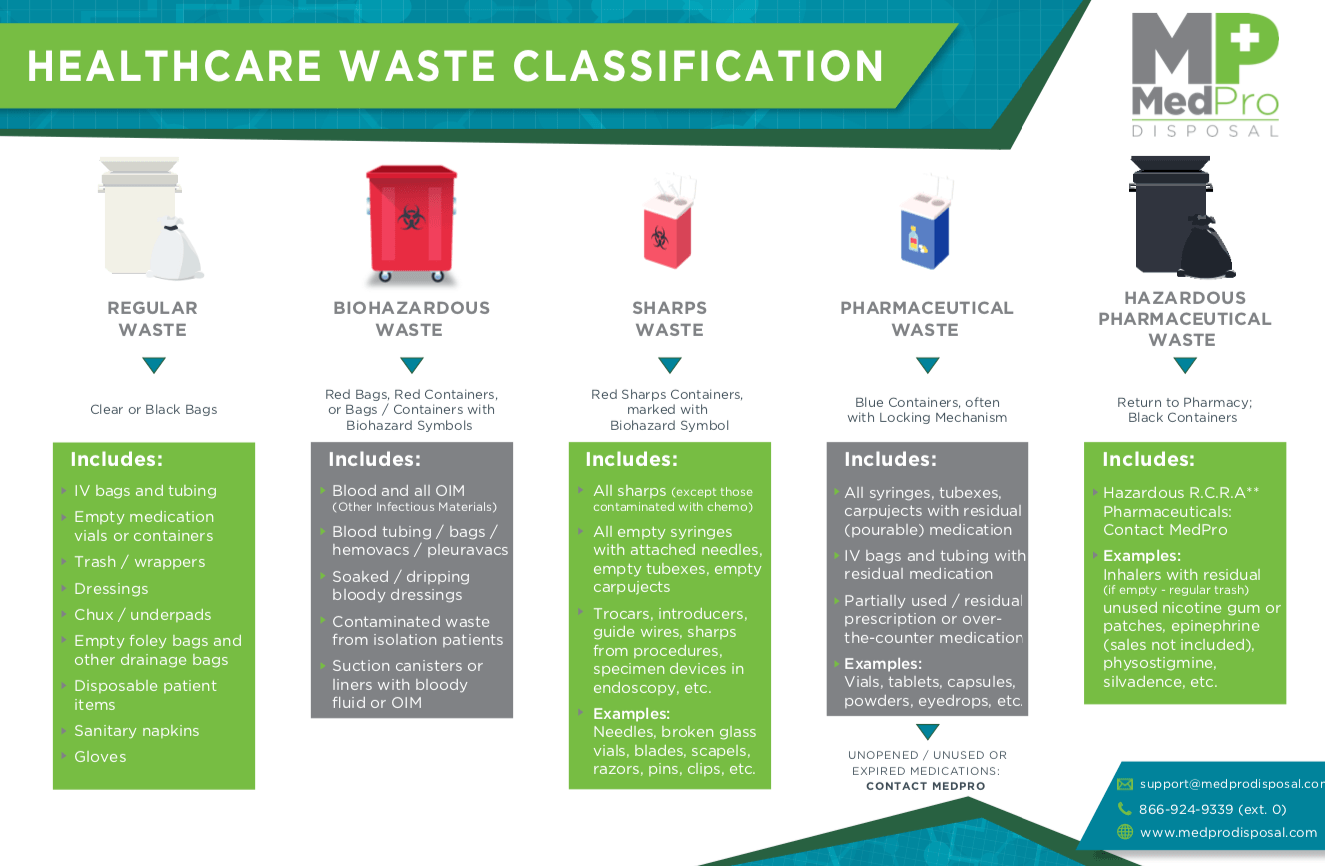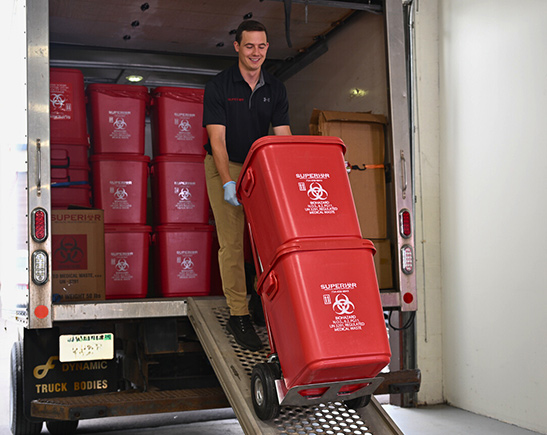Structured Solutions: Simplifying Medical Care Protocols with Expert Medical Waste Disposal
Structured Solutions: Simplifying Medical Care Protocols with Expert Medical Waste Disposal
Blog Article
The Importance of Correct Garbage Disposal Practices
The administration of waste is an essential element of environmental stewardship that commonly goes unnoticed in our lives. Proper garbage disposal methods are not simply a matter of comfort however are important for guarding our environments and public wellness. From the repercussions of incorrect waste disposal on our atmosphere to the long-term effects for future generations, the importance of embracing lasting waste monitoring methods can not be overemphasized. By exploring the ecological impact of irresponsible waste disposal, the benefits of recycling efforts, and the significance of community engagement in waste reduction efforts, a much deeper understanding of why appropriate waste disposal practices are vital arises.
Environmental Influence of Improper Disposal
Improper disposal of waste positions a significant risk to the environment due to its destructive effects on environments and human wellness. When waste is not properly handled, it can bring about pollution of the dirt, air, and water, creating damage to different plant and animal varieties. click here. Chemicals and toxins from poorly disposed waste can leak into the ground, contaminating groundwater resources and affecting the health of both wildlife and humans
In addition, the buildup of waste in landfills creates greenhouse gases like methane, adding to climate modification and global warming. Incorrect disposal practices additionally cause littering, which not just deteriorates the visual value of the setting but can also damage wild animals through intake or entanglement.
To minimize these ecological impacts, it is crucial for communities and people to take on correct garbage disposal methods such as reusing, composting, and accountable hazardous waste disposal. By taking these actions, we can aid secure communities, preserve all-natural sources, and safeguard human wellness for present and future generations.
Advantages of Recycling Programs
Frequently participating in reusing programs provides countless benefits for both the atmosphere and society all at once. Among the vital advantages of recycling is the conservation of natural resources. By reusing materials such as paper, plastic, metal, and glass, less basic materials require to be removed from the earth, resulting in decreased deforestation, mining, and boring tasks. This preservation of resources not just aids in preserving eco-friendly equilibrium however also adds to lasting growth.
In addition, reusing plays a critical duty in lowering energy consumption and greenhouse gas exhausts. The production of products from recycled products typically calls for less energy compared to making from virgin resources - medical waste disposal. Consequently, the carbon footprint related to the manufacturing procedure is substantially reduced, assisting in the battle against climate change
Additionally, recycling programs create work possibilities in the reusing sector, promoting financial development and social well-being. By motivating the recycling and reuse of materials, these programs sustain a round economic climate that minimizes waste generation and maximizes resource effectiveness, ultimately bring about a cleaner, greener future for generations to find.
Hazardous Waste Administration Standards
Carrying out efficient contaminated materials administration guidelines is crucial for lessening ecological and health risks connected with the improper disposal of dangerous materials - click here. Appropriate handling, therapy, and disposal of contaminated materials are necessary to protect against contamination of soil, water sources, and air
One secret standard is appropriate labeling of contaminated materials containers to ensure safe handling and transport. In addition, facilities must stick to stringent storage requirements to prevent leaks, spills, or accidents that could threaten human health and wellness and the environment. Routine training programs for employees on contaminated materials management methods are also important to make sure compliance with laws and promote a society of security.
Furthermore, dangerous waste needs to be segregated based on its residential properties to prevent chain reactions that can bring about dangerous scenarios. Applying an extensive waste radar can aid monitor the movement of dangerous materials from generation to disposal, making certain transparency and responsibility. By following these guidelines faithfully, sectors and businesses can add to a much safer and cleaner environment for existing and future generations.
Community Participation in Waste Reduction
To efficiently resolve the ecological and health and wellness threats linked with dangerous waste monitoring, involving the area in waste reduction campaigns is extremely important. Community involvement plays a crucial role in advertising lasting waste monitoring practices and cultivating a society of environmental responsibility. By informing homeowners regarding proper waste partition, recycling, and composting methods, communities can substantially lower the quantity of waste sent to landfills, thereby decreasing environmental pollution and preserving natural deposits.
Area involvement in waste reduction programs likewise helps in increasing awareness regarding the value of waste minimization and motivates individuals to take on environmentally friendly behaviors in their everyday lives - medical waste removal. Joint initiatives between neighborhood authorities, waste administration companies, and community participants can bring about the application of reliable waste decrease techniques customized to the particular requirements of each community or town
In addition, area engagement fosters a sense of possession and responsibility amongst locals, equipping them to take proactive steps towards lowering waste generation and promoting a cleaner, much healthier setting for current and future generations. By working together in the direction of typical waste decrease objectives, neighborhoods can make a substantial influence on reducing the adverse results of improper waste disposal practices.

Future of Sustainable Waste Practices
The development of sustainable waste techniques is vital for progressing ecological stewardship and source preservation in the coming years. As the international population continues to expand, so does the quantity of waste produced (medical see it here waste disposal). Conventional waste disposal techniques, such as landfilling and incineration, are no more lasting in the long term because of their substantial ecological influences. Moving on, the future of sustainable waste techniques hinges on accepting a circular economic situation strategy, where resources are recycled, recycled, or repurposed to decrease waste generation.
Technical developments play a crucial role fit the future of lasting waste methods. Advanced waste sorting and recycling innovations can aid boost the efficiency of waste monitoring processes, enabling the healing of valuable sources from waste streams. In addition, the adoption of biodegradable materials and composting approaches can help in reducing the amount of organic waste finishing up in land fills, consequently mitigating greenhouse gas exhausts.
Furthermore, promoting customer understanding and education on appropriate waste segregation and disposal practices is crucial for driving behavioral adjustment in the direction of sustainability. By promoting a culture of waste reuse, decrease, and recycling, areas can collectively add to a cleaner and much healthier setting for future generations.

Final Thought
Finally, appropriate garbage disposal techniques are essential for reducing environmental effect and promoting sustainability. By executing recycling programs, taking care of dangerous waste appropriately, and encouraging neighborhood involvement in waste decrease efforts, we can work in the direction of a cleaner and healthier setting. It is vital for organizations, federal governments, and individuals to prioritize lasting waste practices for the future health of our planet.
.jpg)
From the repercussions of inappropriate waste disposal on our setting to the lasting effects for future generations, the importance of adopting sustainable waste administration practices can not be overstated. By discovering the environmental influence of untrustworthy waste disposal, the advantages of reusing initiatives, and the relevance of neighborhood engagement in waste decrease efforts, a deeper understanding of why proper waste disposal techniques are crucial arises.
By enlightening citizens concerning appropriate waste segregation, recycling, and composting techniques, neighborhoods can dramatically minimize the amount of waste sent out to land fills, consequently reducing environmental air pollution and conserving all-natural resources. (click here)
Relocating onward, the future of sustainable waste practices lies in embracing a circular economic situation strategy, where sources are reused, recycled, or repurposed to decrease waste generation.
Advanced waste sorting and recycling modern technologies can help enhance the efficiency of waste management procedures, enabling for the recovery of beneficial sources from waste streams.
Report this page